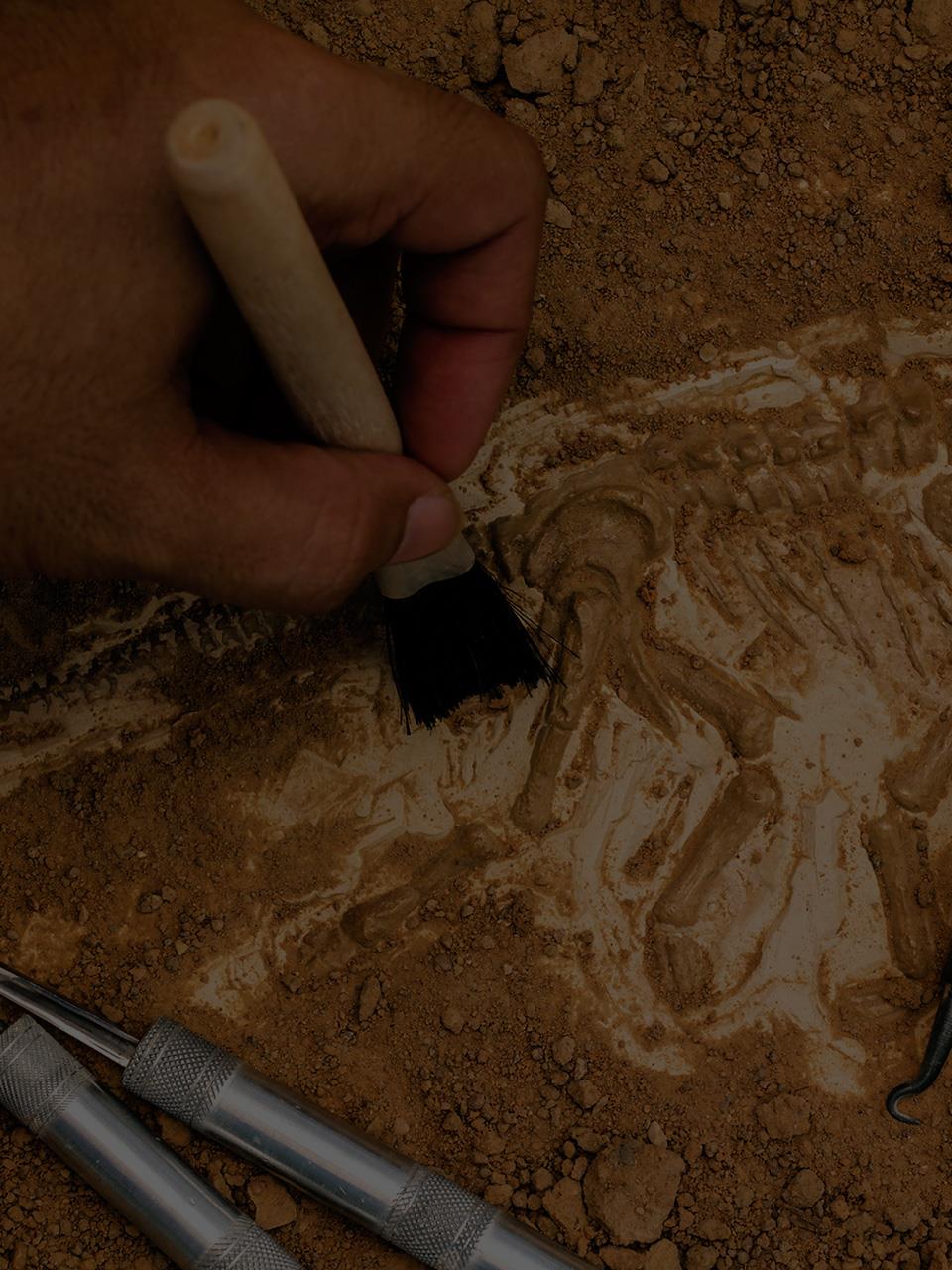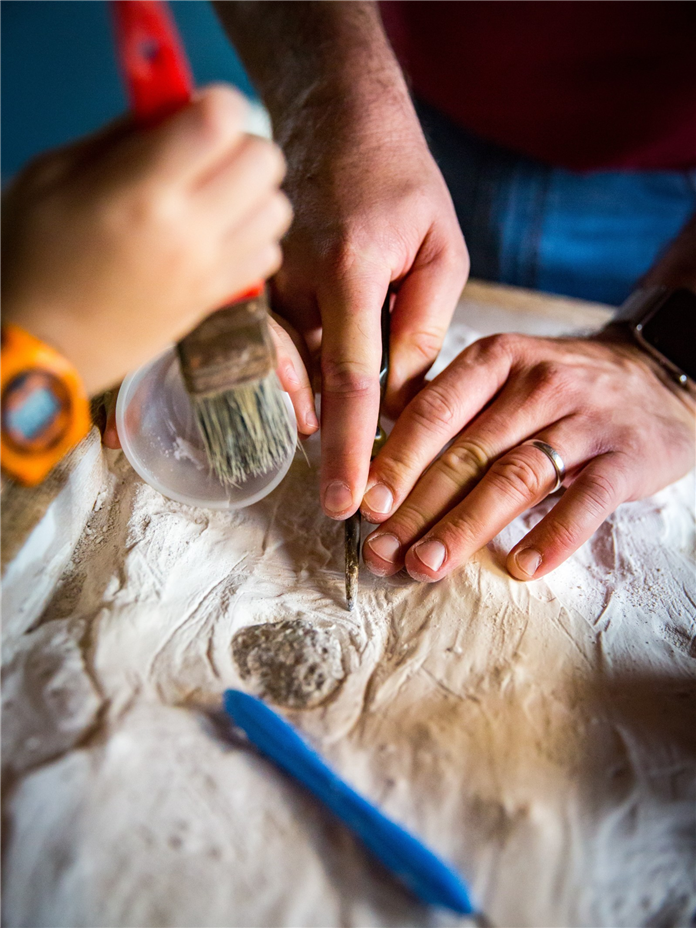Paleontology is the study of prehistoric life, its environment, as well as evolution of life. The story below elaborates on the job description of a paleontologist.

Tap to Read ➤
Paleontologist Job Description
Chandramita Bora


Paleontology is the study of prehistoric life, its environment, as well as evolution of life. The story below elaborates on the job description of a paleontologist.

Fast Fact:
The word 'paleontology' originates from the Greek language. It is a combination of the words 'palaios', which means 'ancient', and 'logos', which means 'words' (here, it may refer to study). Essentially, paleontology refers to 'ancient study'.

A paleontologist is a professional who studies and researches about life in the prehistoric era. He has expertise regarding fossils, evolution, and the relationship between the different life forms and their environment.

In other words, he is concerned with unearthing the history of our planet by studying the fossils of extinct animals, plants, and other forms of life. He is not an archaeologist though, the two fields are different.

Working in the field of paleontology requires you to have special qualifications, in addition to a heart-felt dedication towards the subject. The paragraphs below will enlist the responsibilities of a paleontologist.

Job Profile
- The main job of a paleontologist is to recover, as well as study the fossils of animals and other organisms to find out their approximate age and the history of evolution so that some key facts about the prehistoric earth can be unveiled.

- To locate such fossils, they have to excavate sedimentary rocks. Such field work often calls for frequent trips to fossil-rich areas.
- The tools that are commonly used in the excavation process are picks, drills, chisels, shovels, and brushes.

- Excavation is followed by examination of the various discoveries, and then, research.
- Research is the major part of the job of a paleontologist.
- It involves studying and analyzing the discoveries and results obtained.

- He has to spend a lot of time in laboratories, analyzing and comparing the results that they have obtained with the existing scientific data.
- He also has to trace back the fossil period. This is usually done with the help of radiometric dating. DNA research along with biostratigraphy are also employed for this purpose.

- Job duties may vary slightly as per the sub-branches; some of them include micropaleontology, vertebrate paleontology, invertebrate paleontology, paleoecology, paleobotany, and evolutionary biology.
- Field work involves a lot of digs. There are some professionals who specialize in working solely with remains.

- After research, paleontologists publish their findings and observations in papers.
- They also work closely with geologists and geo-scientists.

- Many of the highly experienced and eminent ones travel across the globe, delivering seminars and guest lectures, having consultations with industry experts, and conducting debates and discussions with budding paleontologists.

- They conduct extensive research on unearthed rock fossils, for oil and gas extraction industries.
- Some work at museums as educators and guides.
- They have to be adept at radar scanning and other technical advancements, since they are used in field work in order to ease the process of fossil extraction.

- They work on animal skeletons - they use radiometric dating to find out everything about the living organism, i.e., his diet, life span, etc.
- They draw important conclusions that act as prerequisites for further research and development.

Requirements
- If you are serious about a career as a paleontologist, you will need to begin early. While in high school, make sure to take up and score well in the subjects of mathematics and science.

- You may even visit museums occasionally, make notes, and read related books to upgrade your knowledge.
- Post high school diploma, enroll in a bachelor's degree in science with a specialization in subjects, like biology, mathematics, chemistry, geology, geography, or any of the earth sciences.

- Furthermore, apply for a post-graduate program at a reputed university. Here is where you will choose your specialization.
- You could opt for sedimentation, sedimentary petrology, ecology, vertebrate and invertebrate zoology, genetics, evolutionary biology, mineralogy, structural geology, and many more.

- You could start working after obtaining your master's degree, but a doctoral degree or a Ph.D. will give you better prospects.
- After education, you can get a research-based job or opt to teach at a reputed university.

- You will also need to be knowledgeable about statistical analysis, computer modeling, data analysis, digital mapping, as well as geographic information systems.
- You will need to enhance your knowledge with time; keep reading various journals, attend seminars and conferences, and visit museums.

Salary and Career Outlook
- The BLS predicts a median salary of approximately USD 107,000 for paleontologists (and related designations).
- Salaries vary with respect to the educational requirements, experience, location, and employment sector.

- In the metropolitan states of New York, California, Connecticut, Washington, Colorado, New Hampshire, etc., paleontologists earn between USD 100,000 to USD 130,000.
- The states of Hawaii, Delaware, Nevada, Idaho, Florida, etc., pay between USD 70,000 to USD 90,000.

- Likewise, a candidate who has completed his Ph.D. is like to earn more in research/teaching than someone who has completed his master's degree.
- Industry-wise, the ones who worked in manufacturing sector earn between USD 120,000 to USD 160,000.

- Teaching jobs fetch between USD 60,000 to USD 90,000, while research pays approximately between USD 110,000 to USD 140,000.
- The BLS has predicted a job growth rate of 6% for this field.

- A career as a paleontologist would require you to travel to different places. You may or may not work regular hours; however, the job is interesting enough for you to tolerate the same.

Paleontology is a fascinating branch of science. It is essential that you have a genuine interest in the concepts of evolution, fossils, and other geological facts in order to be a good paleontologist. All the best!